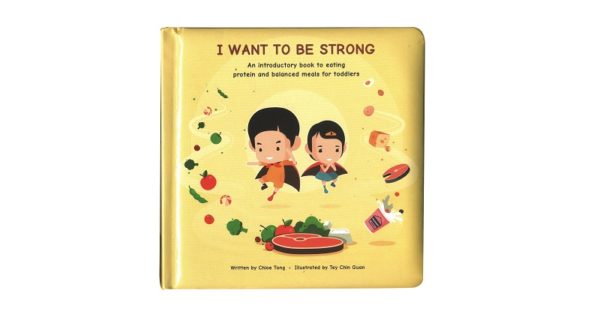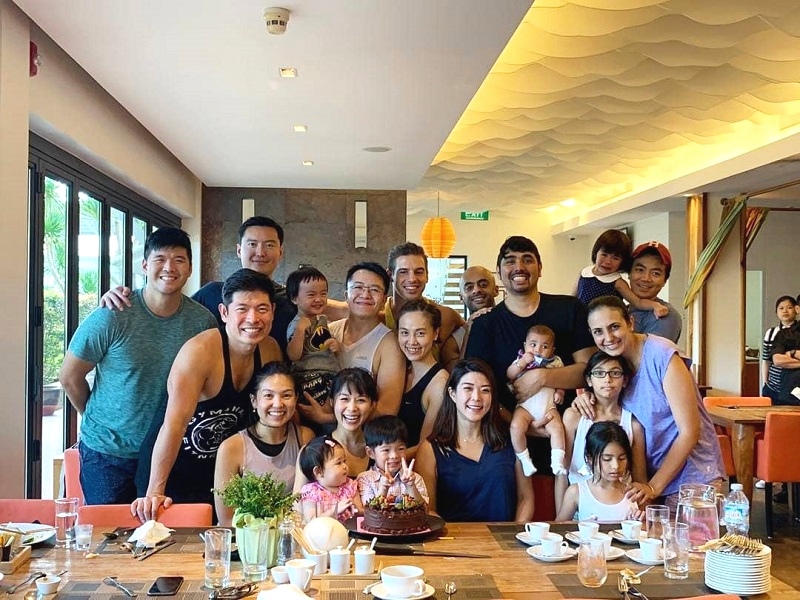
The author of ‘I Want to be Strong’ on prioritising her family’s health and relationship with food.
Getting her two young children to eat well sounds easy-peasy for Chloe Tong: Eat balanced meals together, snack on fruit and make mealtime fun. As for whether healthy eating came about naturally with motherhood, she says: “I wouldn’t even categorise it as healthy eating but just having a good relationship with food.”
No one at home mentioned the word “diet” while she was growing up. “We didn’t even have a weighing scale! We were never deprived of any junk food — I remember the freedom of buying food from the canteen — but ate tasty, home-cooked meals. There were always healthy snacks lying around and freshly cut fruit in the fridge.
“I’m mindful of what I eat. I love healthy, nutritious food but also believe in [eating in] moderation and being able to enjoy my favourite foods with loved ones,” says Tong, a hands-on mother to 3½-year-old Emmanuel and Elizabeth, who is almost two.
She feels it is important to understand basic nutrition, starting from the ingredients that go into food preparation and their benefits, to food groups that can optimise our health.
Emmanuel’s curiosity about food and his father’s — Grab co-founder and CEO Anthony Tan — muscles prompted Tong to come up with I Want to be Strong, a simple booklet about proteins and balanced meals for toddlers.

‘I Want to be Strong’ is a simple booklet about proteins and balanced meals for toddlers
“He is always asking about food items and where his food comes from. Lately, he has taken a strong interest in cooking! I was looking for very basic books that talk about food groups and what we should eat to make our bodies feel good, but couldn’t find any. So I started writing this and reading it to them and it eventually became a book,” Tong explains in an email interview.
She adds that children need to be familiar with new words and concepts related to nutrition and health before they can begin to understand what it is all about. So, she slips in ideas like building muscles with protein-packed foods, excessive sugar intake leading to tooth decay and how being strong makes them agile as well as resistant to the flu.
The booklet is directed at young ones who are starting to develop a preference for food by learning from adults. Therefore, the best thing parents can do is teach them to eat a balanced diet: how different types of food are necessary for development; why it is fine to have chocolate or cake but not overindulge; to eat when they are hungry and stop when they are full; and to remember that food is nourishment and a blessing, not something to make them feel bad about themselves.
Reflecting on her own experience, Tong says there were no labels or restrictions when it came to eating, but she and her three siblings knew what was good for them. “I grew up absolutely loving cod [fish] and okra and we drank herbal soup every day, which I used to hate but now love.”

Tong encourages parents to teach their kids about nutrition
Although constant travel has led to frequent meals outside for the family, they still prefer home-cooked dishes, especially soups. “My husband and children would choose ginseng soup over a burger any day. The children also think fruit and coconuts are the greatest things in the world and treat them like candy.
“When we’re out, our children generally eat what we eat. Right now, what works for us is having more balanced meals at home and being a lot more relaxed when we eat out.”
As a young working mother who lists health, fitness, food, being active and children as her passions, Tong knows laying the foundation for healthy eating is hard work, but it is not impossible.
“Don’t over-complicate it — most kids’ meals take less than 15 minutes to prepare. Make big batches over the weekend and freeze them. Clear out your kitchen: Do not have junk food lying around so you are not tempted to give in. Our children look at what we eat and mimic us.”
All too familiar with schools telling parents that they serve cake for morning break but “it’s light and not too sweet”, she believes it is time to rethink what we feed our children. One of her pet peeves is misleading packaging, such as “healthy” claims on boxes of sugar-laden breakfast cereals.

Tong enjoys healthy, nutritious food but also indulges in moderation
Play dates where fast food and soft drinks are served freely can negate efforts to instil good eating habits. Emmanuel will always ask if he can have what is given to him. “I pass the responsibility to them and say, ‘Just choose one because it won’t make you feel good if you have more’. More often than not, they cannot even finish what they’ve chosen because they aren’t used to that amount of sugar.”
Tong suggests that parents could also let their children go on a full stomach or feed them with proper food at the party first. “Keep wholesome alternatives in your bag, such as freeze-dried apples, sugarless snacks or cherry tomatoes.”
Mealtime is never perfect or easy and families may struggle with fussy eaters or over-eating. “I’m always working towards making meals enjoyable but [I] don’t always succeed. What helps is when we eat the same food together and laugh and talk about our day.” And, definitely no screen time at the dining table, she adds.
Another no-no is parents telling their children to stop eating because they are overweight. She thinks that will create more unhealthy habits, such as dieting and bingeing on food. It is important to ascertain the cause of a child’s weight gain by evaluating what the family eats. Do parents understand basic nutrition? Are they leading an active lifestyle? Does the child have emotional or psychological issues in school or at home that need to be addressed?

Being active is more than just going to the gym, says Tong, who makes sure holidays for her family are activity-based
Food is one part of the good-health equation. The other part is an active lifestyle, according to Tong, who weight-trains to stay fit. However, an hour or two at the gym followed by a sedentary lifestyle throughout the week does little for one’s health.
Tong, who was an active athlete in school, advocates walking whenever possible and letting the kids run, cycle and play. “Most of our weekend getaways or breaks are always adventurous. We surf if we’re on the beach, spend lots of time at the playground and ski every Christmas. We hardly ever choose destinations or holidays that are not activity-based.”
Studies show that a sound mind is in a sound body, which is why Tong believes being a part of a sports group is a huge factor in children’s feeling accepted and important. “It creates so much more determination and drive from within them.” Besides, the benefits of an active lifestyle last through to adulthood.
Is I Want to be Strong the start of more books centred on healthy eating for children? “I have a lot on my plate now, with my third baby on the way. It may not be a book, but I’d love to push for more fun and family-friendly activities, especially for toddlers,” she says.
Chloe Tong is the daughter of The Edge Media Group chairman Datuk Tong Kooi Ong.
This article first appeared on July 29, 2019 in The Edge Malaysia.